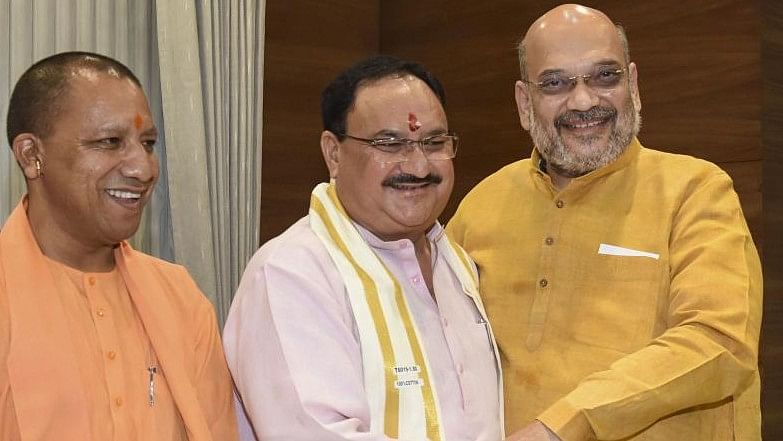
BJP leaders Yogi Adityanath, J P Nadda, and Amit Shah
Credit: PTI Photo
As the campaigning for the elections to the Maharashtra Assembly and the second phase of polling in Jharkhand, scheduled for November 20, come to an end, it becomes increasingly clear that the Bharatiya Janata Party (BJP) continues to rely on divisive and sectarian electioneering as its default mode.
Let’s sum up the basic thrust of the rhetoric on offer. In Jharkhand, there has been the allegation, repeated ad nauseam, that Bangladeshi refugees have flooded the state, thus changing its demographic profile. This pie-in-the-sky accusation has been hitched to an even older figment dreamt up by Sangh parivar ‘ideologues’ — that of ‘love jihad’. In other words, not only are Bangladeshi running tribal people — the sons of the soil — off their land, they are also entering into marital relationships with the ‘indigenous’ people to alter the religious profile of the state.
The infiltration bogey was first raised by Godda MP Nishikant Dubey a while back. In July, Dubey dreamt up the fantasy that infiltrators were overrunning Jharkhand. He demanded a National Register of Citizens (NRC) for the state, while also making a plea for a separate Union Territory to be carved out of the West Bengal districts of Malda and Murshidabad. The latter demand was risibly echoed by other BJP leaders. We shall return to this theme later.
In the runup to the assembly elections and a raft of by-elections in many states, most prominently Uttar Pradesh, where 10 seats go to the bypolls, another set of polarising electioneering tacks were injected into the electoral discourse. It was kicked off by Uttar Pradesh Chief Minister Yogi Adityanath with the ‘batenge to katenge’ slogan back in August, apparently in the context of the unrest in Bangladesh. Even at that point, the slogan, which loosely translates as ‘if we are divided, we will be destroyed’, was obviously perceptible as little more than a dog whistle. Let’s elucidate this point before getting closer to the elections.
The context then suggested this call as an appeal for national unity. Decoded in that same context, however, this was meant to be a counter against the calls issued by various constituents of the Indian National Developmental Inclusive Alliance (I.N.D.I.A.) for a caste census. The dog whistle was meant to be a wake-up call for the majority community against the ‘depredations’ of the minorities. This became clear as the elections approached, as we shall see.
Let’s return to the Jharkhand case. In the runup to the Jharkhand elections, which concluded its first phase of polling on November 13, the infiltration rhetoric was ratcheted up, with BJP leaders slinging around the divisive allegation that Chief Minister Hemant Soren was encouraging infiltration for electoral gains, presumably suggesting that he was colluding to create a settled vote bank.
Unsurprisingly, Union Home Minister Amit Shah added his voice to the divisive chorus. At the same time, efforts have been made over time to drive a wedge between tribal communities on religious lines by playing the Sarna religion against Christianity.
In the larger electoral context, Adityanath’s slogan was regurgitated to promote a divisive agenda, especially in Maharashtra. It fell not only to opposition parties to deplore this ploy. Some of the constituents of the Maha Yuti, too, were forced to distance from this divisive slogan. Nevertheless, Prime Minister Narendra Modi chimed in with his own version of sectarianism, in the shape of the slogan, ‘ek hai, toh safe hai’. The unmistakable dog whistle is in the suggestion that the majority community is somehow unsafe or under threat.
The discomfort of the Maha Yuti constituents points to a conclusion that follows ineluctably from the foregoing. And that is the unfortunate reality that the BJP is prepared to sow division and discord with the only purpose of winning elections. All parties want to get power, that is why they exist. But, fortunately, not all of them are ready to cause social conflict and civil strife to get there.
The ironic bit is that the party that positions itself as the true defender of the national interest, and often dubs its antagonists as anti-national, causes the greatest damage to the nation. It is for the Opposition to call this bluff and expose the malign designs of the peddlers of majoritarianism.
(Suhit K Sen is author of ‘The Paradox of Populism: The Indira Gandhi Years, 1966-1977’.)
Disclaimer: The views expressed above are the author's own. They do not necessarily reflect the views of DH.
Assembly Elections 2024 | The Maharashtra Assembly polls will take place against the backdrop of a fractured political landscape in the western state where the Shiv Sena and NCP will be going up against the Uddhav Thackeray and Sharad Pawar factions, even as the BJP and Congress try to make their mark. Meanwhile, in Jharkhand, the JMM faces a new challenge after Hemant Soren's recent arrest and Champai, a longstanding party member, joining the BJP. The Haryana election resulted in a shock loss for Congress, which was looking to galvanize on the Lok Sabha poll performance, while J&K also saw the grand old party eventually stepping away from the cabinet, with Omar Abdullah's JKNC forming government. It remains to be seen if the upcoming polls help BJP cement its position further or provide a fillip to I.N.D.I.A. Check live updates and track the latest coverage, live news, in-depth opinions, and analyses only on Deccan Herald.
Subscribe and follow DH on Whatsapp, X, Facebook, YouTube, and Instagram to never miss out on anything.